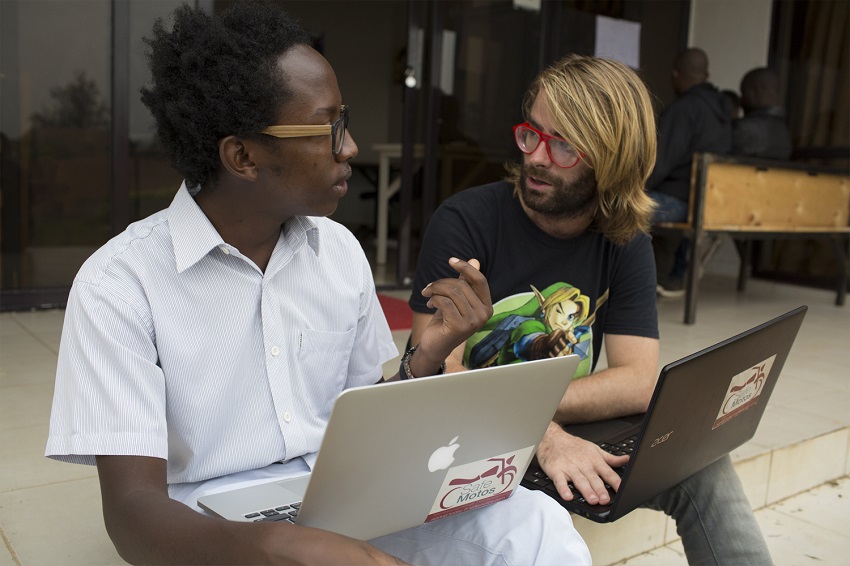In this guest post, Peter Kariuki and Barrett Nash, the co-founders of Rwandan motorcycle taxi app SafeMotos, discuss the limits of Africa’s tech revolution.
Welcome to Kigali, Rwanda, where the sun is always shining and the burritos are surprisingly delicious. While the first thing that pops into most people’s mind when the word Rwanda comes up is the devastating genocide that happened more than twenty years ago, the current reality is far different. In a country where the average age is less than twenty, the majority of the country was not even born when the genocide happened.
Kigali is a modern city. There is a pulsating rhythm of optimism. Its new convention centre is a luminous orb visible from every corner of the city. Rush hour peaks early in the morning and late at night as workers revel in the rapid change of what has been the fastest de.
The technology scene is symbolic of this new Rwanda. Kigali is filled with sleek tech hubs and enough hipster coffee shops to make Seattle blush. It seems like every place you turn you will find one of Kigali’s cosmopolitan youths pecking away code on a Macbook bursting with ideas for the technology company that will disrupt Africa and unlock the potential of the poorest continent in the world.
Technology has to be key to this movement. The Economist estimates at current GDP growth rates it would take 300 years for emerging markets to economically converge with the United States. If these latte loving elites in Kigali want their country to not just grow but to be able to access the same level of hope, opportunity and prosperity that westerners take for granted then society needs to be hacked in the way that Henry Ford eliminated horses, Google made the entirety of human knowledge available with a click and Facebook made a digital country of Farmvilling friends that is the largest on earth.
Exciting things are happening, the news cycle is gradually shifting from news of war to projects like Google’s Loon where balloons in the air will bring internet to every home, solar projects like Mobisol where users turn the lights on by topping up a SIM, and our own SafeMotos, where the accelerometer in cheap Android smartphones is used to make motorcycle taxis safer. There are seeds sprouting, flat out cool things are happening.
However, the clouds on the horizon are daunting. The gleaming skyscrapers give charming views of mud villages housing the subsistence farmers that make up 90 per cent of the population of this country, the education system isn’t producing enough global talent and that talent too often leaves, access to venture capital is more reminiscent of visiting loan sharks than watching an episode of Silicon Valley, and too many ‘hackers’ believe modifying a WordPress theme is coding.
There is one issue beyond all else that defenestrates the technology ecosystem of Rwanda and Sub Saharan Africa, it is something that every tech entrepreneur in the region worth their salt sees time and time again yet we too often lack the vocabulary to communicate effectively. This issue is the pedantry of global tech elites and companies that assume the solutions to Africa’s challenges will be solved in Silicon Valley board rooms with views of roads filled with driverless cars instead of by those who live on the continent, with its views of matatus and boda bodas. To the technology aristocracy the concept of Africa rising is too often nothing more than a good photoshoot, a place to parachute a lean startup ‘expert’ for a weekend hackathon instead of an ecosystem that can produce a unicorn.
This expectation creates a vicious feedback loop. How can a vibrant tech ecosystem appear in Africa when Twitter has no offices, Facebook employs less than fifty people and Google barely cracks one hundred. Uber’s Kenya team, which has performed a million trips, is just three people. The odd free lunch under a Google banner does not make up for the fact that Google’s subcontracted sales teams for services like their Maps API is the only meaningful contact most African startups ever receive from the company.
How are the techies of this region supposed to benefit from the natural osmosis that permeates places like Silicon Valley, Cambridge and London and was the incubator of today’s titans when the closest thing they meet to a real engineer is text chat from a support team? How are the entrepreneurs supposed to get that little bit of seed money to launch the next world changing idea when the closest good job is an ocean away?
It is the people of Africa who suffer. We will see more balloons and flashy articles than transformative new products that change the lives of the world’s poorest. The ideas to shift the paradigm of opportunity in Africa will never come from a Silicon Valley board room.
Too many Africans will continue to think that technology is synonymous with using WhatsApp and Facebook, captive consumers without knowing that the technology in their pocket is infinitely more powerful than the supercomputers that were used to put man on the moon. Perhaps the tragedy of 300 years to catch up with America is something that will play out as the seeds of tech optimism receive no water, no sunshine from those who claim to be its biggest proponents.


